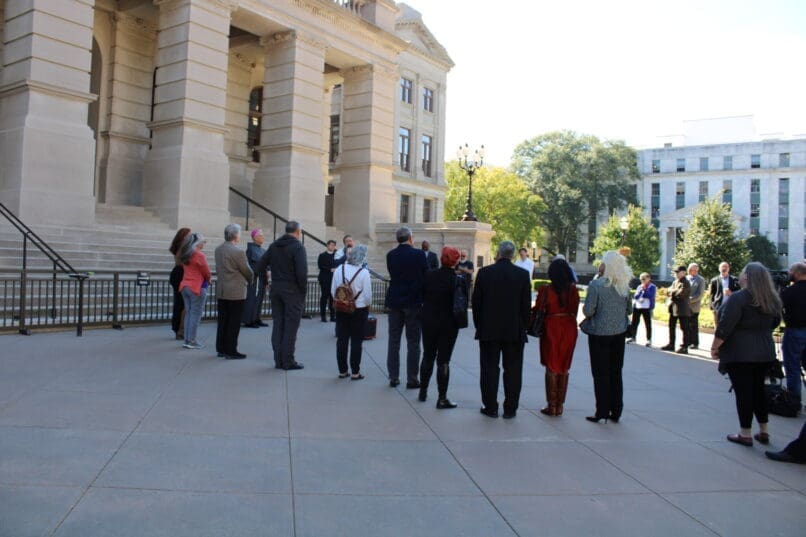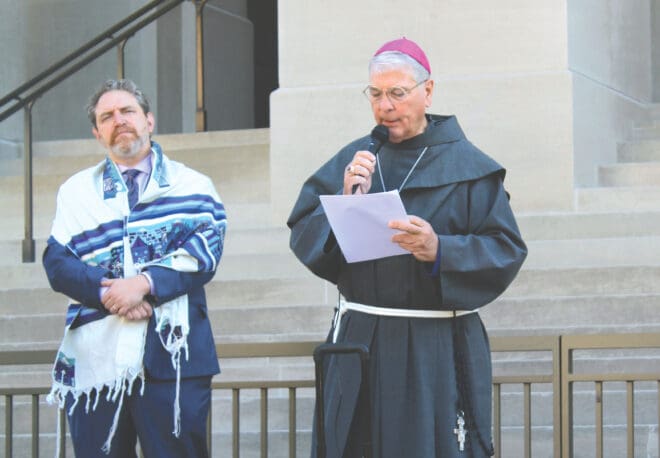 Photo by Nichole Golden
Photo by Nichole GoldenAtlanta
Archbishop Hartmayer joins interfaith effort for death penalty reform
By NICHOLE GOLDEN, Editor | Published October 18, 2023
ATLANTA—United in a common commitment to end the death penalty, dozens of faith leaders and advocates assembled outside the Georgia State Capitol Oct. 10 for a prayer vigil.
More than 50 people gathered in front of the capitol for World Day Against the Death Penalty. A coffee and conversation event preceded the noon service.
The Archdiocese of Atlanta joined Georgians for Alternatives to the Death Penalty (GFADP), the Faith Leaders of Color Coalition, the Episcopal Diocese of Atlanta, Central Presbyterian Church and Ebenezer Baptist Church in sponsoring the event.
“It’s a beautiful day to end the death penalty in Georgia and the world. Your presence here today matters,” said Cathy Harmon-Christian, executive director of GFADP.
Harmon-Christian said there’s a clear trend in public opinion to move away from capital punishment. “But the U.S. remains an outlier,” in its continued application globally, she said.
Harmon-Christian shared that the United States has the fifth highest number of executions behind China, Egypt, Iran and Saudi Arabia.
Archbishop Gregory J. Hartmayer, OFM Conv., offered remarks and prayer, standing with leaders of Christian, Jewish and Muslim communities and other faith traditions.
The archbishop said that there is strength in speaking as a united interfaith community. He said the Catholic Church is “unequivocal in its rejection of the capital punishment” and that the teaching has developed over time.
In 2018, Pope Francis asked that the Catechism be updated to include that the death penalty is inadmissible because it is an attack on the inviolability and dignity of the person.
It is “contrary to the Gospel because it entails the willful suppression of a human life that never ceases to be sacred in the eyes of the creator,” said Archbishop Hartmayer, summarizing the pope’s teaching.
The archbishop said that belief in dignity of all humanity demands us to reject the death penalty, and actively work for its abolition in the state, country and the world.
“I have seen firsthand how even one person—one person’s commitment to life—can make an impact,” said Archbishop Hartmayer.
In 2016, Father Rene Robert a priest of St. Augustine, Florida, was kidnapped and murdered by Steven Murray. The murder occurred with the Diocese of Savannah when Archbishop Hartmayer was the bishop there.
Father Robert had signed a declaration of life asking that should he ever be murdered the killer be spared from the death penalty.
Archbishop Hartmayer joined other bishops in pleading with the district attorney to honor the late priest’s wishes. Murray was sentenced to life without parole.
“We know that Father Rene’s declaration of life played a part in this outcome,” said the archbishop.
Father Robert’s life is proof that an individual can make a difference in a complicated issue, he said.
“Let us all dream for a moment. What impact could we all have together? And then let us make that dream a reality,” said Archbishop Hartmayer.
He concluded with prayer for victims of violence and those on death row, for the innocent to be freed and that the guilty come to acknowledge their faults and seek reconciliation.
“Give us wisdom and a heart filled with your love” to build a society that truly chooses life in all circumstances, prayed the archbishop.

Archbishop Gregory J. Hartmayer, OFM Conv., offered prayer and remarks at the vigil held on the Washington Street steps of the Georgia State Capitol. More than 50 people gathered to pray for abolition of the death penalty in Georgia and the world Oct. 10. Rabbi Mike Rothbaum listens to the archbishop’s reflection. Photo by Nichole Golden
Bishop Robert Wright of the Episcopal Diocese of Atlanta also offered prayer and reflection at the vigil. Bishop Wright said that when he became a bishop, he realized that while he opposed the death penalty, he had not applied much faith in action. After spending time to “draw near” to death row inmates, he began to entertain the lawyer’s question to Jesus, “Who is my neighbor?”
“We kill people, that’s what we do. I learned that capital punishment as it’s practiced in Georgia … is state-sanctioned mob violence. Worse than that it’s predicated on a tragic lie,” he said.
The lie is that it that it restores healing to the victims’ families, said Bishop Wright. Another false assumption is that when people gather to uphold the dignity of those on death row, there’s somehow no space for them to also consider the crime victims.
“They think of us as some sort of bleeding hearts who have no real understanding of the pain that’s been experienced by people. We’ve got to remember the people who are presently suffering because of the actions of the men and women who are on death row. We can do both,” he said
“God’s mercy is bigger than our mercy,” said Bishop Wright. “And if we can access his mercy, we can understand the meaning of neighbor more broadly.”
The Episcopal bishop said he believes that legislators know capital punishment is wrong, yet have to uphold the law as it is.
“I don’t think we have to be adversarial, but we can be purposeful,” he said about teaming up with unusual partners to abolish the death penalty. He believes data shows the days of capital punishment are numbered
“But how many more are going to die before it’s all over?” he asked.
Faith in action
At the end of the vigil, Harmon-Christian requested that interfaith leaders sign a letter to the Georgia General Assembly, which will convene again Jan. 8, 2024. The letter asks lawmakers to change the standard of proof for those with intellectual disabilities in capital cases.
Archbishop Hartmayer, Bishop Stephen Parkes of the Diocese of Savannah, and all of Atlanta’s auxiliary bishops signed the letter to support the effort.
“Georgia stands as the 50th of 50,” said Harmon-Christian regarding the state’s standard of proof for intellectual disabilities in capital cases, which is “beyond a reasonable doubt.”
It is the highest standard in the nation, and the letter requests that “reasonable doubt” be changed to “a preponderance of the evidence.”
The letter reads in part, “Only through this change in the standard of proof can we prevent the wrongful execution of a person with an intellectual disability from occurring.”
“We ask you to respect the values of Georgia’s people of faith, as well as the supreme law of the land, and take action to prevent any more executions of our most vulnerable from occurring,” reads the letter in closing.
Jayna Hoffacker, director of restorative justice for the Archdiocese of Atlanta, said the situation is ironic as Georgia was the first state to voluntarily draft legislation regarding death sentences for those who have intellectual disabilities. The 1988 Georgia law pre-dated the 2002 Supreme Court ruling in Atkins v. Virginia that found execution of those with intellectual disabilities violated the Eighth and Fourteenth Amendments’ protections against cruel and unusual punishment.
A problem with the wording of Georgia’s law created the unintended consequence of a higher burden of proof, the same standard of proof for guilt or innocence.
The proposed remedy, backed by the faith leaders, will cause the bill to “behave as it was intended to,” said Hoffacker.
According to Georgia Catholics Against the Death Penalty (GCADP), intellectual disability is characterized by significant limitations in both intellectual functioning and in adaptive behavior, which covers everyday social and practical skills. This disability originates before the age of 22.
Hoffacker added that those with intellectual disabilities have problems in reasoning, decision making and understanding the consequences of actions. Many times, defendants in capital cases don’t have access to school files or other records that could document their disability, or records don’t even exist.
Feb. 7, 2024, will be a day of advocacy for advocates of death penalty reform. Hoffacker encourages those interested to sign up for GCADP newsletters. There will also be talking points for advocates as bipartisan support will be needed for the effort to be successful.
Hoffacker said it was good to see the “overarching” support of many faith traditions at the Oct. 10 vigil.
“It’s about protecting the vulnerable,” she said.

